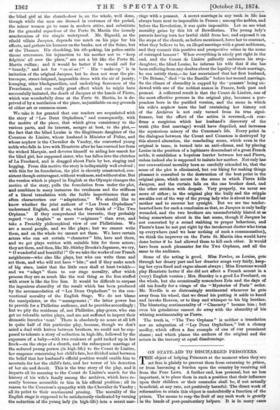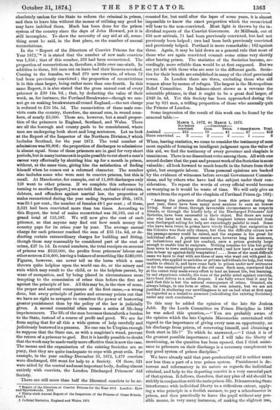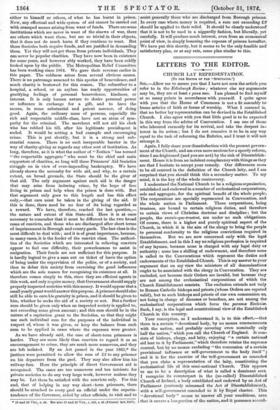ON STATE-AID TO DISCHARGED PRISONERS.
rEobject of helping Prisoners at the moment when they are et free is plainly to prevent them from returning to prison, or from becoming a burden upon the country by receiving aid from the Poor Laws. A further end, less personal, but no less important, is to place them in such a position that their influence upon their children or their comrades shall be, if not actually beneficial, at any rate, not positively harmful. The direct work of reformation to attain this object is undoubtedly a function of the prison. The means to reap the fruit of any such work is greatly in the hands of post-penitentiary helpers. It is in many cases absolutely, useless for the State to reform the criminal in prison, and then to leave him without the means of utiliaing any good he
may have imbibed there. Much has been done for the prison system of the country since the days of John Howard, yet it is still incomplete. To show the necessity of any aid at all, some- thing must be said, in the first place, on the number of annual reconvictions.
In the "Report of the Directors of Convict Prisons for the Year 1872,"* it is stated that the number of new male convicts was 1,356; that of this number, 233 had been reconvicted. The proportion of reconvictions is, therefore, a little over one-sixth. In addition to these, 105 men out on leave had their licences revoked. Coining to the females, we find 270 new convicts, of whom 72 had been previously convicted ; the proportion of reconvictions is in this class larger, being rather more than one-fourth. In this same Report, it is also stated that the gross annual cost of every prisoner is £30 14s. 9d. ; that, by deducting the value of their work, as, for instance, the Portland Breakwater—though we can- not go on making breakwaters all round England,—the net charge is reduced to 210 16s. 5d. The reeonviction of these male con- victs costs the country, therefore, the annual sum, in round num- bers, of nearly 13,000. These are, however, but a small propor- tion of the prisoners in England, Scotland, and Wales. There are all the borough and county gaols to be remembered, where men are undergoing both short and long sentences. Let us look at the Report of the Inspector of the Northern Division,t which includes Scotland, for the year 1872. The total number of admissions was 99,806; the proportion of discharges to admissions is almost equal. Some of these prisoners are in gaol for very short pexiods, but in many instances it isquite possible to cut short a man's career very effectually by shutting him up for a month in prison, without, at the same time, giving him the satisfaction of finding himself when he cornea out a reformed character. The number also includes some who were sent tb convict prisons, but this is small. At Manchester, for example, out of 11,809 discharges only 159 went to other prisons. If we complete this reference by turning to another Report,I we are told that, exclusive of convicts, debtors, and offenders against martial law, the proportion of males reconvicted during the year ending September 29th, 1872, was 35-1 per cent., the number of females 48.1 per cent. ; of these, 2,321 had been convicted more than ten times. According to this Report, the total of males reconvicted was 36,183, out of a grand total of 113,587. We will now give the cost of each prisoner, so that anyone may find out how much money the country pays for its crime year by year. The average annual charge for each prisoner reached the sum of £35 11s. 6d, or de- ducting certain extraordinary charges for building and fitting, though these may reasonably be considered part of the cost of crime, 2,27 1s. 1d. In round numbers, the total receipts on account of prisons was 2622,000, the profits from prisoners' labour and other sources £54,600, leaving a balance of something like 2560,000. Figures, however, can never tell us the harm which a man thrown quite helpless upon the world can do, or the misery and ruin which may result to the child, or to the helpless parent, by want of occupation, and by being placed in circumstances more tempting to the commission of crime than before the first act against the principle of law. All this may be, in the view of some, the proper and natural consequence of the first cause,—a wrong done, but every principle of justice and economy points out that we have no right to arrogate to ourselves the power of bestowing greater punishment than by the policy of the law is judicially given. A second committal often means a series of life-long imprisonments. The life of the man becomes thenceforth a burden to the State, instead of a source of profit and good. We are far from saying that for all this a wide system of help carefully and judiciously bestowed is a panacea. No one can be Utopian enough to suppose that the State can, as with a magician's wand, prevent the return of a prisoner to gaol. But it is hardly possible to doubt that the work may be made vastly more effective than is now the case. The means and the organisation of the existing Societies are so puny, that they are quite inadequate to cope with great evils. For example, in the year ending. December 31, 1872, 1,479 convicts were discharged, 698 went for help to a Society. Of these, 521 were aided by the central and most important body, dealing almost entirely with convicts, the London Discharged Prisoners' Aid Society.
There are still more than half the liberated convicts to be ac-
* Report of the Directors of Convict Prisons for the Year 1872. London: Eyre and Spottiswoode. 1873.
t Thirty-sixth Annual Report of the Inspectors of the Prisons of Great Britain, Part I.
Judicial Statistics, England and Wales, 1872.
counted for, but until after the lapse of some years, it is almost impossible to know the exact proportion which the reconvicted will bear to the non-convicted. Most light is thrown by the in- dividual reports of the Convict Governors. At Millbank, out of 638 new arrivals, 71 had been previously convicted, but had not previously been helped ; two had been both previously convicted and previously helped. Portland is more remarkable ; 162 against three. Again, it may be laid down as a general rule that most of those who are again convicted commit some crime very shortly after leaving prison. The statistics of the Societies become, ac- cordingly, more reliable than would be at first supposed. But we are yet left with those who are sent to the different gaols. Socie- ties for their benefit are established in many of the chief provincial towns. In London there are three, excluding those who aid women alone by means of refuges. The largest is the Metropolitan Relief Committee. Its balance-sheet shows as a revenue the miserable pittance, in that it ought to be a great deal larger, of 2849 5s. 4d. Yet this Society has been approached during the year by 621 men, a trifling proportion of those who annually quit the Prisons of London.
Some impression of the result of this work can be found by the annexed table :— Meson 1, 1872, To lissca 1, 1873.
Not before .---Convicted---,
convicted. Once. Twice. 3 times &more. Total.
Assisted 315 70 41 27 458 Since convicted ... 3 2 2 1 8
When, leaving statistics, we come to consider the testimony of men most capable of forming an intelligent judgment upon the value of this aid, we find the testimony of every governor and chaplain is unanimous. There is no dissentient voice among them. All with one accord declare that the past and present work of the Societies is most valuable ; all look forward to much benefit in the future from their quiet, but energetic labour. These personal opinions are backed by the evidence of witnesses before several Government Commis- sions, and by others who have had the subject under their con- sideration. To repeat the words of every official would become as wearying as it would be waste of time. We will only give an extract from the report of the chaplain of Portland Prison (p. 168):
"Among the prisoners discharged from this prison during the past year, there have been many most anxious to earn an honest living. Some of these, through favourable circumstances as respects friends, or through the kindly help of the Discharged Prisoners' Aid Societies, have been successful in their object. But there are many also who have not been so, and the frequent letters received from men discharged asking for help are exceedingly painful to read. Some who have been twice in prison have wisely thought that emigration to the Colonies was their only chance, but then the difficulty occurs how the passage-money could be raised, and the expense is too great for individual effort. A prisoner cannot now, however long his sentence, or industrious and good his conduct, earn a prison gratuity large enough to enable him to emigrate. Nothing remains for him but going from town to town seeking precarious work ; and how hard a matter for him to bear up against daily temptation! .... Some of the most difficult cases we have to deal with are those of men who went out with good in- tentions, who applied to societies or private individuals for help, but were unable to obtain it, and have come back to prison under new sentences or for the unexpired portion of the old ones. Such men, convinced that at the outset they made every effort to lead an honest life, but learning, by sad experience outside, the tone of the public mind against convicts, have been driven to a sullen despair. I am fully aware that it may be said that this is but the natural consequence of crime. Granted, sin always brings, in one form or other, its own misery, but we are not justified in sheltering our unwillingness to set on foot what at first may be regarded as a tentative measure (subsidising the existing Societies) under any such conclusion."
To this may be added the opinion of the late Sir Joshua Jebb. By the Lords Committee on Prison Discipline in 1863 he was asked this question,—" You are probably aware of the opinion which the late Captain Maconochie entertained with regard to the importance of giving every man an opportunity, on his discharge from prison, of recovering himself, and Obtaining a fresh start in life?" To which he answered,—" I think it is of the greatest possible importance ; and I will take the liberty of mentioning, as the question has been opened, that I think assist- ance to prisoners on their discharge is a necessary complement to any good system of prison discipline."
We have already said that post-penitentiary aid is neither more nor less than a part of a true prison system. Punishment is de- terrent and reformatory in its nature as regards the individual criminal, and help to the departing convict is a very essential part of that system. It follows, therefore, that any plan of aid should be strialy in conjunction with the main prison-life. It is narrowing State interference with individual liberty to a ridiculous extent, apply- ing a wise principle in a foolish manner, to pay a schoolmaster in prison, and then practically to leave the pupil without any pos- sible means, in very many instances, of making the slightest use, either to himself or others, of what he has learnt in prison. Now, any effectual and wide system of aid cannot be carried out with cramped means arising from want of funds. There are-some institutions which are never in want of the sinews of war, there are others which want them, but are so trivial in their objects, that it does not do much harm if they continue to want. But these Societies both require funds, and are justified in demanding them. Yet they will not get them from private individuals. They can never be popular charities. They have now been in existence for some years, and however ably worked, they have been coldly looked upon by the public. The Metropolitan Relief Committee has been working since 1864. We gave their revenue earlier in this paper. The coldness arises from several obvious causes. There is no patronage annexed to this species of benevolence, and much charity is bestowed for this reason. The subscriber to a hospital, a school, or an asylum has ready opportunities of gratifying feelings of personal benevolence, kindness, or interest. It is only human nature to desire personal power or influence in exchange for a gift, and to have the means, in some substantial and patent manner, of doing good. Again, the ordinary mass of persons, especially the rich and respectable middle-class, have not an atom of sym- pathy for the criminal. The merchant will not aid his clerk who has robbed his till, after his legitimate punishment is ended. It would be setting a bad example and encouraging crime. This is put shortly, but it is a strong and sub- stantial reason. There is no such insuperable barrier in the way of charity-giving as regards any other sort of institution. As long, therefore, as it is what the author of " Eothen " has termed "the respectable aggregate" who must be the chief and main supporters of charities, so long will these Prisoners' Aid Societies struggle on in view of ever-impending bankruptcy. We have already shown the necessity for wide aid, and why, to a certain extent, on broad grounds, the State should be the giver of that aid. The only argument against such aid is the danger that may arise from inducing crime, by the hope of free living in prison and help when the prison is done with. But that argument only goes to this length and has this effect only,—that care must be taken in the giving of the aid. If this is done, there need be no fear of its being regarded as a reward. We have, therefore, reached the last question,— the nature and extent of this State-aid. Here it is at once necessary to remember that it must be different in the two broad cases of convicts, and those who are discharged after short terms of imprisonment in Borough and county gaols. The last class is the most difficult to deal with ; and it is of great importance, because, in many cases, it is the feeder of the convict class. The authori- ties of the Societies which are interested in relieving convicts appear to feel one difficulty, their powerlessness to assist in emigration. Their funds are not sufficient for this purpose. It is hardly logical to give a man out on ticket of leave the option of being under the supervision of the police, or of a society, and then to debar this society from exercising the good influences which are the sole reason for recognising its existence at all. It therefore comes simply to this, since they are efficient agents in this work, and only require money, that Government should supply properly inspected societies with this money. It would appear that a small yearly grant would answer this purpose. A prisoner should also still be able to earn his gratuity in prison, and it should be given to him, whether he seeks the aid of a society or not. But a further sum should be given only when an inspected society is applied to, not exceeding some given amount ; and this sum should be in the nature of a capitation grant to the Societies, so that they might use each individual sum for the purposes of the individual in respect of. whom it was given, or keep the balance from such sum to be applied in cases where the expenses were greater.
As we have already said, the case of short-term prisoners is harder. They are more likely than convicts to regard it as an encouragement to crime, they are much more numerous, and they are left isolated. By an Act passed in the year 1862,* the justices were permitted to allow the sum of £2 to any prisoner on his departure from the gaol. They may also allow him his railway-fare. Here the principle of direct. Government aid is recognised. The cases are too numerous and too intricate for private societies to do any very large work, however zealous they may be. Let them be satisfied with the convicts only. For this end, that of helping in any way short - term prisoners, there should be attached to every gaol an official under the superin- tendence of the Governor, aided by other officials, to visit and to • 25 and 26 Viet., c. 44. See also 28 and 29 Viet., C. 126, S. 41 (Prisons' Act, 1865).
assist generally those who are discharged from Borough prisons. In every case where money is required, a sum not exceeding £3' should be applied to their relief. It should be clearly understood' that it is not to be used in a niggardly fashion, but liberally, yet carefully. It will produce much interest, even from an economical point of view, in simply lessening the expense of prisons hereafter. We have put this shortly, but it seems to be the only feasible and satisfactory plan, or at any rate, some plan similar to this.








































 Previous page
Previous page